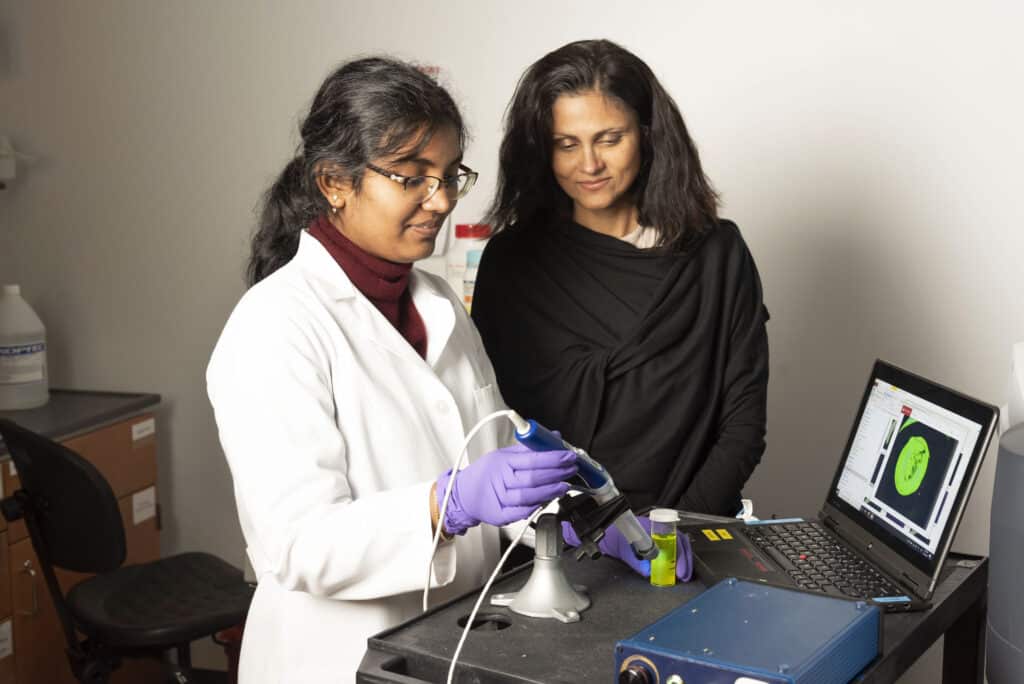Ramanujam Receives $10.4 Million to Improve Existing Treatments for Breast Cancer
Michaela Martinez
With the support from the Department of Defense’s 2024 Innovator Award, Nimmi Ramanujam and an interdisciplinary team of researchers aim to improve the detection and treatment of early-stage breast cancer

Nimmi Ramanujam, the Robert W. Carr, Jr. Distinguished Professor of Biomedical Engineering, received the 2024 Innovator Award from the Department of Defense’s Breast Cancer Research Program. Intended to support the work of researchers who have demonstrated exceptional creativity, innovative work and paradigm-shifting leadership, the award provides more than $10.4 million in funding for four years.
When Ramanujam founded the Center for Global Women’s Health Technologies (GWHT) at Duke in 2013, her goals were clear: pursue work that helps eliminate mortality from cervical and breast cancer by making diagnosis and treatment more accessible for women around the world.
It’s safe to say her work has been impactful. In the decade since the center’s founding, Ramanujam, the GWHT director, and her collaborators created the Pocket Colposcope and the Callascope, both intended to increase access to early detection of cervical cancer in resource-limited settings. These tools enable more than 95 percent of women to receive proper care in midwife-run community clinics.
With the support from the DoD’s Breast Cancer Research Program, Ramanujam and her team hope to make similar strides to address early-stage breast cancer. Breast cancer accounts for roughly 30 percent of all new female cancers in the United States each year, and accounts for nearly a quarter of all cancers in women worldwide. The chance of a woman in the US being diagnosed with breast cancer during her lifetime is about 1 in 8 today.
“Until we have a vaccine, the diagnosis and treatment of early-stage disease is the shortest path to elimination. We are at a point where we know quite a bit about the tumor microenvironment and how tumor cells escape therapy and ultimately recur. Our goal is to leverage both the behavior of the tumor and its microenvironment to create technologies that can slow down or stop breast cancer from evolving into a lethal disease.”
Nimmi Ramanujam,
Robert W. Carr, Jr. Distinguished Professor of Biomedical Engineering
To accomplish this, Ramanujam will work with Brian Crouch and Megan Madonna, both assistant research professors in Duke BME, and Marlee Krieger, the executive director of GWHT to pursue three projects to improve the detection and treatment of breast cancer.
The first project involves developing a new treatment that could be given to patients prior to surgery to remove the cancerous cells. Rather than a chemotherapy, this new drug would activate the immune system to promote an anti-tumor response.
“The idea is that if the cancer were to ever recur in the future, you’ve basically trained the body to identify, attack and kill any tumor cells that form,” said Crouch. “The bulk of the preclinical work for this is done, so the grant allows us to work with physicians to run a phase-1 clinical trial in patients with early-stage breast cancer to measure the anti-tumor response.”

The second project will draw on the center’s imaging expertise to study how specific cancer types respond to treatment and identify the optimal treatment plan. Using animal models, the team will use imaging techniques to measure the metabolism of breast cancer cells before and after treatment to determine if the cancer is responding effectively to treatment or whether additional treatment, like a stronger form of chemotherapy or radiation, is necessary. Ideally, this work would be useful for general study of tumor behavior and for patient-specific tumor models.
“Our thinking is that tumors’ response to any therapy can be measured by looking at how that tumor uses nutrients for fuel,” said Madonna. “This grant will challenge us to pinpoint how a tumor’s metabolism can better report on how successfully a tumor is treated, beyond what can typically be understood from current standard of care practices.”
In a similar vein, the final project involves using optical tools to determine whether a patient needs treatment in the first place, and if they do, what level is necessary. By examining both fresh tissue samples and biopsy samples, the team will use a combination of optical and computational tools to predict the long-term outcome and risk level for patients.
“We treat all early-stage breast cancers with the same treatments we’d use for more progressed cases, but some of these early-stage cancers can actually resolve on their own,” said Krieger. “But there is a small subset of patients that need aggressive treatments to prevent metastases or future recurrence. This project will help us identify which patients are at the highest risk.”
Outside of her collaborators in GWHT, Ramanujam has assembled an inter-disciplinary team across the Pratt School of Engineering, the Duke University School of Medicine and the University of Wisconsin, Madison. Her program leadership team will include Crouch, Alexandra Thomas, an oncologist and professor of medicine and associate director of translational research at the Duke Cancer Institute, Lee Wilke, a breast cancer surgeon and the Hendricks Chair in Breast Cancer Surgery Research at the University of Wisconsin School of Medicine and Public Health. Additional members of the team at the DUSM include Maggie DiNome, the chief of breast surgery, Eun Lee Langman, assistant professor of radiology, Carey Anders, a professor of medicine and chief of the division of medicaloncology, Rachel Factor, associate professor of pathology, Smita Nair, professor of surgery, and Matthew Hirschey, an associate professor of pharmacology and cancer biology.
“This award enables us to revolutionize treatment regimens by replacing them with ones that are more effective, less toxic and positively impact survival”. said Ramanujam. “In collaboration with my outstanding team, I will pursue high-risk, high reward research that I believe will maximize therapeutic benefit for early-stage breast cancer patients without wearing their bodies down and without stretching resources to an unacceptable level”.
